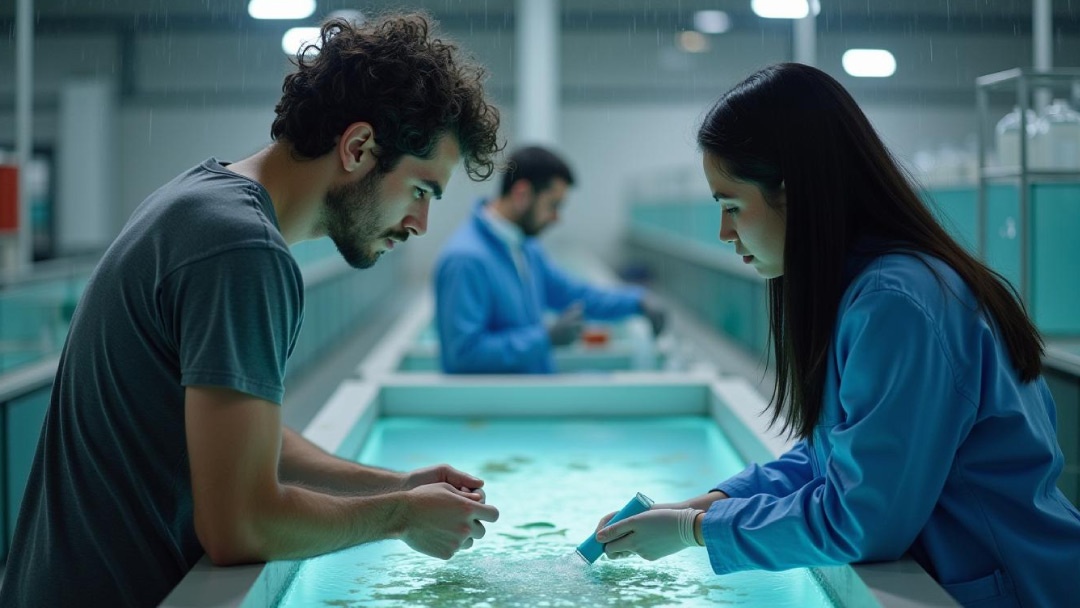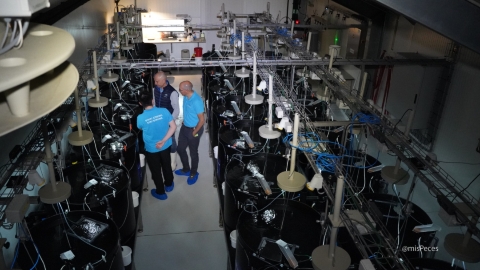
Professionals poised to lead advancements in aquaculture will need to meld zootechnical knowledge with expertise in disruptive innovations being integrated into the field, such as the Internet of Things (IoT), automation, and Artificial Intelligence. Given the current advances and challenges, it’s clear that new expertise will be crucial to effectively leverage these technologies.
Recirculating Aquaculture Systems (RAS), for instance, are expanding rapidly, driving a growing demand for specialists who can fine-tune these technologies for environmental sustainability. Those working in this area will need to manage advanced filtration systems, recirculation pomps, water quality sensors, waste treatment systems, temperature control units, and oxygenation devices-all vital for maintaining a stable and healthy aquatic environment.
The next logical step for RAS involves integrating Artificial Intelligence to automate processes like feeding, health monitoring, and water quality management. Data scientists and AI specialists will be instrumental in developing algorithms that enhance efficiency and cut costs.
Meanwhile, offshore aquaculture is set for significant expansion bur requires robust infrastructure capable of withstanding harsh ocean conditions. Marine engineers will design and implement cutting-edge systems, vessels, and monitoring technologies, enabling sustainable expansion into open waters. Their efforts will ensure that offshore operations are efficient and resilient to environmental challenges.
The use of robots for tasks such as the net cleaning, health monitoring, and vaccine delivery is also a rapidly growing area. Robotics engineers will be key in designing and maintaining autonomous systems that operate effectively in diverse environments. These systems will not only improve operational accuracy but also significantly reduce the labour intensity of aquaculture, making it more cost-effective.
Blockchain technology is already revolutionising traceability and transparency in seafood supply chains. Genome editing using CRISPR/Cas holds immense potential for breeding disease-resistant and fast-growing fish. Geneticists and biotechnologists will be in high demand to advance these technologies, tackle regulatory challenges, and ensure ethical implementation. Their work will accelerate genetic improvements and enhance the overall efficiency of aquaculture, paving the way for more sustainable practices.
Meanwhile, the shift to alternative proteins, such as insect meal, algae-based feeds, and single-cell proteins, is transforming the aquaculture feed sector. Disease management remains one of aquaculture’s most pressing challenges. Veterinary immunologists are at the forefront of developing oral vaccines and other advanced solutions to reduce fish mortality and enhance their welfare. Their contributions will ensure the health of farmed populations while minimising the need for labour-intensive vaccination processes.
The integration of disruptive technologies in aquaculture is not just about increasing production; it’s about building a sustainable and resilient industry. As AI optimizes operations, robotics automates labour-intensive tasks, and blockchain enhances transparency, skilled professionals will be needed to manage these innovations effectively. Moreover, with environmental sustainability becoming a cornerstone of aquaculture, roles focused on renewable energy, food innovation, and ecological management will be key to the industry’s responsible evolution.
By promoting these professional profiles, aquaculture can address the dual challenges of feeding a growing global population while protecting the planet. The future workforce will drive innovation and sustainability, ensuring the sector’s continued growth and success in the coming decades.
With the right expertise, this high-tech industry is poised to become a model of environmentally conscious and cutting-edge production.


